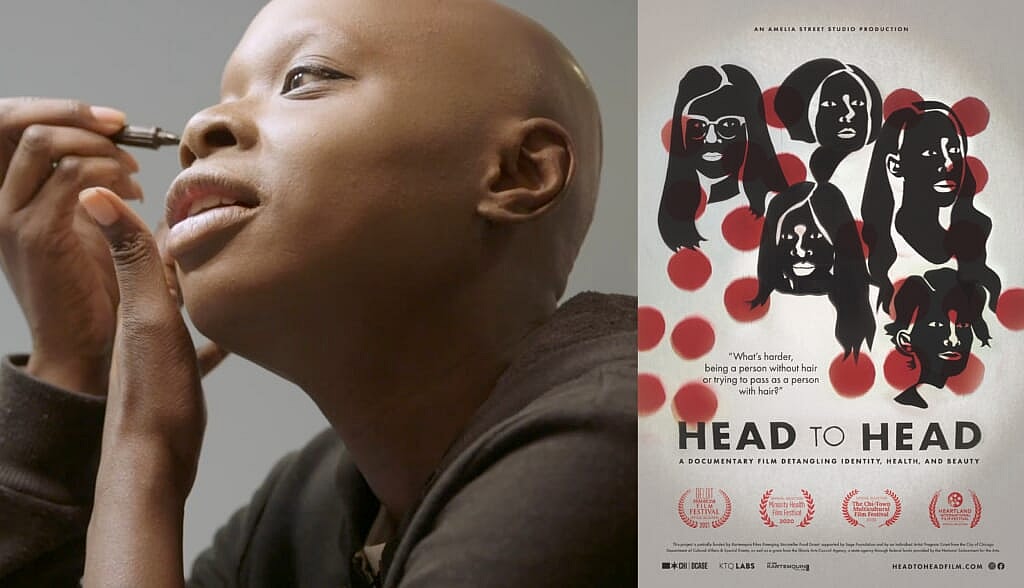“I’ll never know how little other people think about their hair—or how much other people think about their hair. All I know is how often I think about mine.” So says a voiceover at the opening of Head to Head, a feature documentary exploring the links between hair loss and mental health in women. While male pattern baldness has been widely discussed and addressed, the impact of hair loss upon women has only become a matter of public discourse in recent years, thanks in large part to well-known women like Ayanna Pressley, Jada Pinkett Smith, and interior design maven Sheila Bridges, all of whom have disclosed their experiences with the autoimmune skin disease alopecia areata.

Alopecia areata can occur even in early childhood; however, female hair loss can result from numerous factors, including other types of alopecia (including traction alopecia caused by protective styles or chemical treatments), as well as cancer treatment, lupus, extreme stress or other genetic or medical factors. Head to Head addresses many of these circumstances, as well as the resulting issues women experiencing hair loss often experience.
As described in a synopsis:
HEAD TO HEAD is a touching and impactful documentary about six women facing the trauma of hair loss who all must choose to either hide the elephant in the room or live outside the norms of beauty. HEAD TO HEAD follows women experiencing traumatic blows to their self-image after unexpectedly losing their hair due to Alopecia, Lupus, or chemotherapy. Among them is the film’s director (Andrea Alberti), who sets out on a five-year journey to tell their stories while grappling with her own identity and what it means to be authentic. Although each of the women experience subsequent mental health, relationship, financial, and social impacts, they individually cope and recover from these challenges in dramatically different ways.
Credit: Head to Head/Freestyle Digital Media
“I believe the most important element of getting this film in front of viewers is not to create sympathy or merely inform others about a medical condition, but to allow viewers to see their own feelings and struggles reflected in the lives of these women,” says filmmaker Alberti in a statement provided to theGrio. “Issues of feeling othered and wrestling with ideas of ‘authenticity’ and what it means to ‘be yourself’ are universal across marginalized groups of all kinds.”
While hair loss can affect women of any race, Black women are especially affected by alopecia. As reported by Refinery29, in the United Kingdom alone, the National Health Services has estimated 8 million women experience hair loss by the age of 50, while Dr. Ifeoma Ejikeme, founder and medical director of London’s Adonia Medical Clinic, estimated almost half of all Black women will experience some form of hair loss.
For any woman dealing with hair loss, its impacts are far more than physical. In a world where hair is often equated to femininity and desirability, there are not only a lack of effective treatments but the often exorbitant costs of transplants and wigs can make it difficult for women to access the options they might desire to help them avoid the stigma of hair loss. “[T]he mental health effects of alopecia I have on me were more detrimental than the alopecia itself,” one subject tearfully explains as she advocates for medical coverage for wigs. Another simply asks: “What’s harder? Being a person without hair, or trying to pass as a person with hair?”
In all, Head to Head gives an intimate and emotional account of the deeper implications for hair loss in women, reaching beyond headlines and aesthetics to explore issues of selfhood, self-esteem, and self-advocacy in the face of uncontrollable circumstances. The documentary is a particularly poignant addition to Mental Health Awareness Month, as it asks us to not only consider the reality the film’s subjects are dealing with but our collectives attitudes about beauty, femininity and worth.
Distributed in North America by Freestyle Digital Media, the digital film distribution division of Byron Allen’s Allen Media Group (parent company of theGrio), Head to Head is now available to rent or download to own on all cable, satellite and digital platforms including Apple, Amazon, AT&T U-verse, Comcast, DirecTV, and more! For more information, visit the Head to Head website.

Maiysha Kai is Lifestyle Editor of theGrio, covering all things Black and beautiful. Her work is informed by two decades’ experience in fashion and entertainment, a love of great books and aesthetics, and the indomitable brilliance of Black culture. She is also a Grammy-nominated singer-songwriter and editor of the YA anthology Body (Words of Change series).
TheGrio is FREE on your TV via Apple TV, Amazon Fire, Roku, and Android TV. Please download theGrio mobile apps today!

